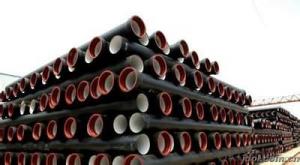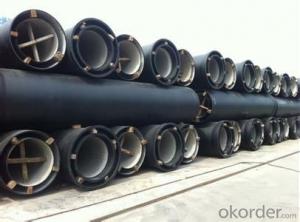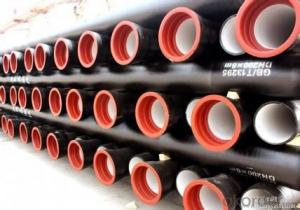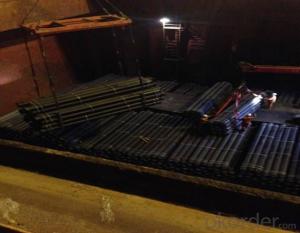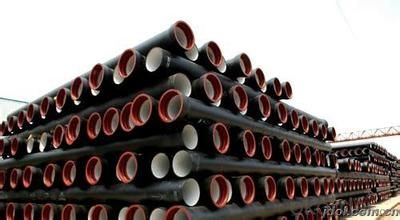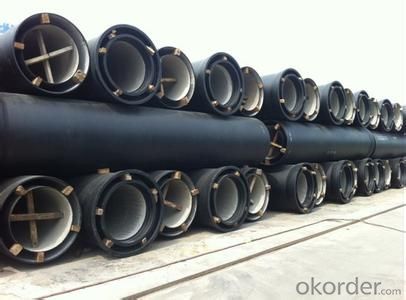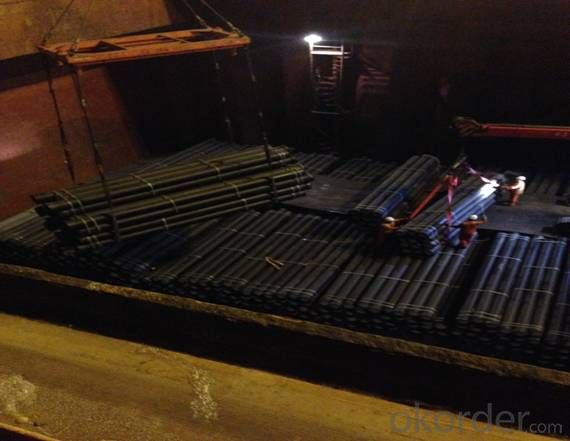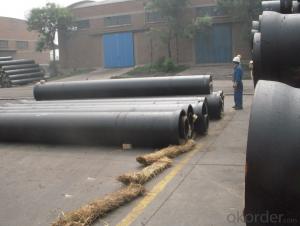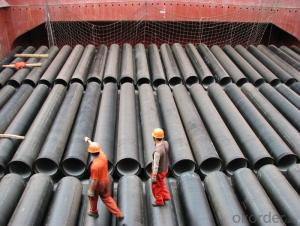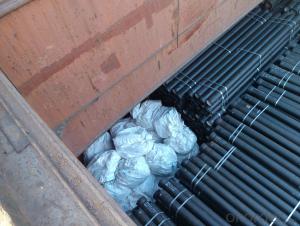DUCTILE IRON PIPE K9 DN80
- Loading Port:
- China Main Port
- Payment Terms:
- TT OR LC
- Min Order Qty:
- -
- Supply Capability:
- -
OKorder Service Pledge
OKorder Financial Service
You Might Also Like
Ductile Iron Cast Pipe is without any defects compare with tradition casting tech, which has many advantages particularly as follow:
(1) High density. In the "vertical upward casting" process, the melt iron of centre liquid column in center crystallizer is continuously feeding for volume shrinkage caused by condensation tube at outer circumference , which lead to be free of shrinkage porosity.
(2) High purity. When melt iron pouring, the mixed impurities such as gas, dross, sand grain which are lighter than melt iron could be eliminated at furnace mouth, its impossible to enter into the crystallizer through the channel, so the melt iron into the crystallizer is very pure.
(3) Strength with toughness. The cooling speed provided by continuous crystallizer is 30 times than sand casting and 5 times than centrifugal casting, and doesn't produce white iron, the eutectic cell volume of continuous cast iron is one eighth to one tenth compare with traditional cast iron. The density of graphite nodule in ductile iron can reach 300-700 pcs/mm2. Therefore, all reason above improve the strength and toughness of continuous cast iron.
(4) Free machining. The high speed cooling make the hardening phase (such as boride, steadite) not appear like reticular, massive or thick, but diffuse like fish bone and pane in shape, moreover, there are tiny graphite flakes inlaid hardening phase. It's free machining in BrinellHardness the range of 250-300HB. However, the Brinell Hardness of 250 is top limit to common metal materials.
(5) Uniform composition of tube wall. The convection mixing of liquid column caused by marching type drawing in crystallizer make the composition of tube wall well-distributed, and concentration gradient very little.
(6) High productivity. To the wall thickness of tube under 10mm, the speed of continuous casting is 1 meter/min, to the wall thickness of tube under 20mm, the speed of continuous casting is 0.5 meter/min, which is high efficiency that centrifugal or other casting tech couldn't reach.
- Q: Are ductile iron pipes suitable for pressure reducing valve stations?
- Ductile iron pipes prove to be suitable for pressure reducing valve stations due to their strength and durability, making them an ideal choice for applications involving high pressure. Pressure reducing valve stations, which regulate and decrease the pressure of a fluid or gas in a pipeline system, can rely on ductile iron pipes to handle the exerted pressure, ensuring an efficient and reliable operation. Moreover, the excellent resistance to corrosion exhibited by ductile iron pipes is crucial in upholding the integrity of the pipeline system, thereby preventing leaks or failures. Overall, the necessary strength, durability, and corrosion resistance required for pressure reducing valve stations are provided by ductile iron pipes.
- Q: Can ductile iron pipes be used in high-temperature applications?
- Yes, ductile iron pipes can be used in high-temperature applications. Ductile iron has excellent heat resistance properties, with a maximum recommended operating temperature of around 450 degrees Fahrenheit. This makes it suitable for a wide range of industrial and commercial applications where high temperatures are involved, including steam, hot water, and thermal oil systems.
- Q: Is it better to use steel tubes or ductile iron pipes for water supply?
- In summary, if the demand is not high, the use of stable environment, pressure and vibration is not a place recommend the use of ductile iron pipe; if is an important facility for high requirements or site conditions, abnormal conditions, vibration and impact may be relatively large, with ordinary seamless steel tube.
- Q: Can ductile iron pipes be used for underground storage of hazardous materials?
- It is not recommended to use ductile iron pipes for underground storage of hazardous materials. Ductile iron pipes are typically utilized for water and sewage systems because of their durability and resistance to corrosion. However, they are not designed to withstand the specific demands and potential dangers associated with storing hazardous materials underground. In the case of underground storage of hazardous materials, it is crucial to utilize materials that are specially engineered to handle the chemical properties and potential risks linked to these substances. Materials such as high-density polyethylene (HDPE) or fiberglass reinforced plastic (FRP) are commonly employed for underground storage tanks due to their excellent chemical resistance and ability to maintain structural integrity over time. Employing ductile iron pipes for such purposes may result in corrosion, leaks, or even catastrophic failures, which could lead to environmental contamination and potential harm to the surrounding areas. Therefore, it is essential to seek advice from experts and comply with relevant regulations and guidelines when selecting materials for underground storage of hazardous materials to ensure safety and prevent potential hazards.
- Q: Can ductile iron pipe be used for both water and wastewater applications?
- Yes, ductile iron pipe can be used for both water and wastewater applications. Ductile iron is a type of iron that has been treated with small amounts of magnesium to create a more flexible and durable material. This makes it suitable for transporting both water and wastewater. Ductile iron pipes are known for their high strength and resistance to corrosion, making them ideal for underground applications. They can handle the high pressures and varying flow rates associated with water distribution systems, as well as the corrosive nature of wastewater. Additionally, ductile iron pipes have a longer lifespan compared to other materials commonly used in water and wastewater applications, such as PVC or concrete. Therefore, they are often chosen for projects that require a reliable and long-lasting pipe material for both water and wastewater transport.
- Q: Can ductile iron pipes be used for drainage systems in airports?
- Yes, ductile iron pipes can be used for drainage systems in airports. Ductile iron pipes are known for their durability, strength, and resistance to corrosion, making them suitable for various applications, including drainage systems. They are capable of withstanding heavy loads, which is important in airports due to the constant movement of aircraft and vehicles. Ductile iron pipes are also flexible, allowing for easy installation and modification when necessary. Additionally, they have a long lifespan, reducing the need for frequent maintenance or replacement. Therefore, ductile iron pipes can be a reliable choice for drainage systems in airports, ensuring efficient water flow and preventing water accumulation, which is crucial for maintaining safe and operational airport facilities.
- Q: What are the different types of joints used in ductile iron pipes?
- Ductile iron pipes commonly utilize various types of joints to achieve secure and leak-proof connections between pipe sections. Here are some of the frequently employed joint types: 1. Push-on joint: This joint type offers easy installation without the need for specialized tools. It entails lubricating the gasket on one pipe end and inserting it into the socket of the adjacent pipe. The gasket ensures a tight seal to prevent any leakage. 2. Mechanical joint: Consisting of a gland and a follower gasket, this joint type involves placing the gland over the spigot end of one pipe and inserting the follower gasket into the bell end of the neighboring pipe. Bolts and nuts are then used to tighten the gland, compressing the gasket and creating a secure joint. 3. Restrained joint: In applications requiring restraint against axial movement or pressure thrust, this joint type is utilized. Typically, it involves a mechanical joint combined with additional components like tie rods, thrust blocks, or restrained couplings to provide the necessary restraint. 4. Flanged joint: Large diameter ductile iron pipes often employ flanged joints. They consist of a flange on one pipe end and a mating flange on the other pipe end. The two flanges are bolted together, establishing a robust and secure connection. Flanged joints enable easy disassembly and reassembly when necessary. 5. Welded joint: Welded joints are created by fusing the ends of two pipes together using heat and pressure. This type of joint ensures a permanent and strong connection. Welded joints are commonly employed in underground or buried applications where long-term durability is a crucial factor. It is essential to consider factors such as pipe diameter, application, and project requirements when selecting the appropriate joint type. Consulting with a professional engineer or referring to the manufacturer's guidelines is recommended to ensure the suitable joint type is chosen for ductile iron pipes.
- Q: What is the maximum temperature that ductile iron pipes can handle?
- The ability of ductile iron pipes to withstand high temperatures is influenced by factors like the grade of ductile iron, the application, and the duration of exposure to heat. Typically, ductile iron pipes are advised to be used within a temperature range of approximately 400-450 degrees Fahrenheit (205-232 degrees Celsius). However, it is essential to refer to the manufacturer's instructions and specifications for the particular product, as temperature limits may vary slightly among grades and manufacturers. Additionally, it is vital to take into account the thermal expansion and contraction properties of ductile iron pipes to prevent any possible problems in environments with elevated temperatures.
- Q: Are ductile iron pipes suitable for installation in areas with high groundwater contamination and soil erosion?
- Areas with high groundwater contamination and soil erosion are typically well-suited for the installation of ductile iron pipes. This is due to the fact that ductile iron pipes are renowned for their durability, strength, and corrosion resistance. They exhibit exceptional resistance to acidic and alkaline soils, rendering them appropriate for regions with elevated levels of groundwater contamination. Moreover, the robust construction of ductile iron pipes grants them a formidable resistance to soil erosion. They are engineered to endure a range of external forces, including the pressure exerted by the surrounding soil and the potential movement resulting from erosion. Consequently, they are a dependable choice for installation in areas prone to soil erosion. Nonetheless, it is vital to acknowledge that while ductile iron pipes can withstand high levels of groundwater contamination and soil erosion, the implementation of proper installation techniques and maintenance practices is crucial to ensure their longevity and optimal performance. Regular inspections, meticulous backfilling, and the application of suitable protective coatings should be employed to maximize the lifespan of the pipes. To sum up, ductile iron pipes are generally well-suited for installation in areas characterized by high groundwater contamination and soil erosion. Their durability, strength, resistance to corrosion, and high resistance to soil erosion establish them as a reliable choice for such environments. However, adhering to proper installation and maintenance practices is imperative to guarantee their longevity and optimal performance.
- Q: Are ductile iron pipes suitable for use in brewery facilities?
- Yes, ductile iron pipes are suitable for use in brewery facilities. Ductile iron pipes are durable, corrosion-resistant, and can withstand high-pressure applications, making them ideal for transporting water, steam, and other fluids within brewery facilities. Additionally, the smooth interior surface of ductile iron pipes minimizes friction and prevents the build-up of sediments or organic materials, ensuring the purity and quality of the beer being produced.
Send your message to us
DUCTILE IRON PIPE K9 DN80
- Loading Port:
- China Main Port
- Payment Terms:
- TT OR LC
- Min Order Qty:
- -
- Supply Capability:
- -
OKorder Service Pledge
OKorder Financial Service
Similar products
Hot products
Hot Searches
Related keywords
